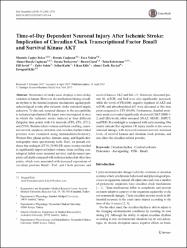Time-of-day dependent neuronal injury after ischemic stroke: Implication of circadian clock transcriptional factor bmal1 and survival kinase akt

Göster/
Erişim
info:eu-repo/semantics/embargoedAccessTarih
2018Yazar
Beker, Mustafa ÇağlarÇağlayan, Berrak
Yalçın, Esra
Çağlayan, Ahmet Burak
Türkseven, Şeyma
Gürel, Büşra
Keleştemur, Taha
Sertel, Elif
Şahin, Zafer
Kutlu, Selim
Kılıç, Ülkan
Baykal, Ahmet Tarık
Kılıç, Ertuğrul
Üst veri
Tüm öğe kaydını gösterKünye
Beker, M. Ç., Çağlayan, B., Yalçın, E., Çağlayan, A. B., Türkseven, Ş., Gürel, B. … Kılıç, E. (2018). Time-of-day dependent neuronal injury after ischemic stroke: Implication of circadian clock transcriptional factor bmal1 and survival kinase akt. Molecular Neurobiology, 55(3), 2565-2576. https://dx.doi.org/10.1007/s12035-017-0524-4Özet
Occurrence of stroke cases displays a time-of-day variation in human. However, the mechanism linking circadian rhythm to the internal response mechanisms against pathophysiological events after ischemic stroke remained largely unknown. To this end, temporal changes in the susceptibility to ischemia/reperfusion (I/R) injury were investigated in mice in which the ischemic stroke induced at four different Zeitgeber time points with 6-h intervals (ZT0, ZT6, ZT12, and ZT18). Besides infarct volume and brain swelling, neuronal survival, apoptosis, ischemia, and circadian rhythm related proteins were examined using immunohistochemistry, Western blot, planar surface immune assay, and liquid chromatography-mass spectrometry tools. Here, we present evidence that midnight (ZT18; 24:00) I/R injury in mice resulted in significantly improved infarct volume, brain swelling, neurological deficit score, neuronal survival, and decreased apoptotic cell death compared with ischemia induced at other time points, which were associated with increased expressions of circadian proteins Bmal1, PerI, and Clock proteins and survival kinases AKT and Erk-1/2. Moreover, ribosomal protein S6, mTOR, and Bad were also significantly increased, while the levels of PRAS40, negative regulator of AKT and mTOR, and phosphorylated p53 were decreased at this time point compared to ZT0 (06:00). Furthermore, detailed proteomic analysis revealed significantly decreased CSKP, HBB-1/2, and HBA levels, while increased GNAZ, NEGR1, IMPCT, and PDE1B at midnight as compared with early morning. Our results indicate that nighttime I/R injury results in less severe neuronal damage, with increased neuronal survival, increased levels of survival kinases and circadian clock proteins, and also alters the circadian-related proteins.
WoS Q Kategorisi
Q1Scopus Q Kategorisi
Q1Kaynak
Molecular NeurobiologyCilt
55Sayı
3Koleksiyonlar
- Makale Koleksiyonu [301]
- Makale Koleksiyonu [3777]
- PubMed İndeksli Yayınlar Koleksiyonu [4230]
- Scopus İndeksli Yayınlar Koleksiyonu [6574]
- WoS İndeksli Yayınlar Koleksiyonu [6631]

















